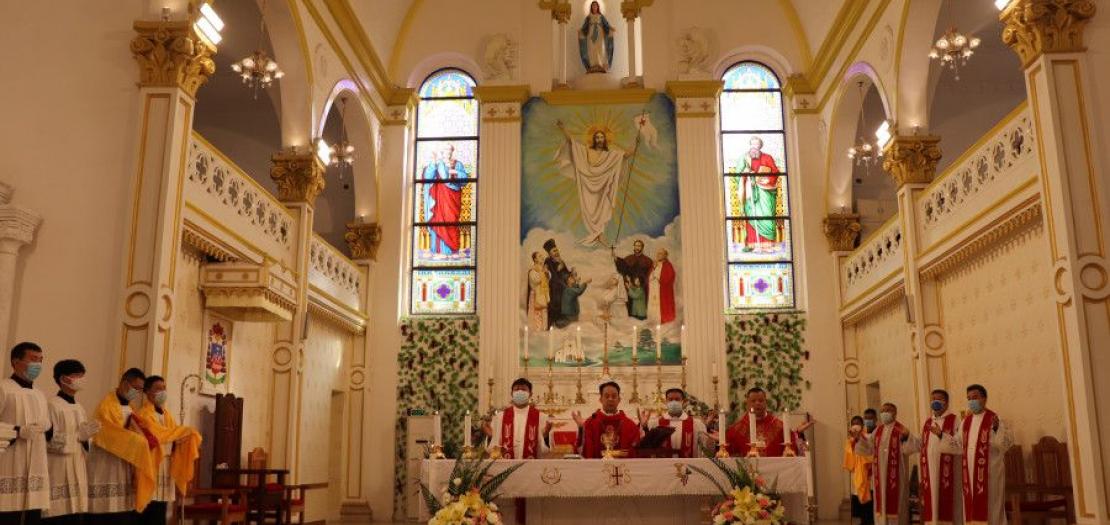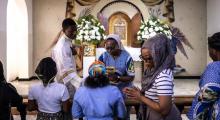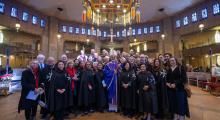Issued by the Catholic Center for Studies and Media - Jordan. Editor-in-chief Fr. Rif'at Bader - موقع أبونا abouna.org

After Chinese authorities appointed without Vatican approval last week a new auxiliary bishop, the Holy See on Saturday released an unusually candid statement of “surprise and regret.”
While the appointment which triggered that statement was not the first unilateral episcopal appointment made by Beijing since the signing of a Vatican-China agreement in 2018, it was unique both in its nature and in the response it provoked from Rome.
It remains unclear whether the appointment was a calculated act of provocation by the Chinese government, or evidence of Beijing’s casual indifference to the Vatican.
But both options suggest an unworkable level of dysfunction underlying the controversial bilateral agreement, and a mounting toll on Chinese clergy.
The Vatican’s November 26 statement was prompted by the “installation” two days earlier of Bishop John Peng Weizhao as auxiliary bishop of Jiangxi, “a diocese not recognized by the Holy See.”
As far as the Vatican is concerned, Peng is the bishop of the Diocese of Yujiang, which he has led since his appointment by Francis in 2014 at a time when the diocese, and its bishop, were still underground.
Beijing claims otherwise. And Peng’s appointment to Jiangxi is different - in kind, not only in degree -- from other recent Chinese episcopal appointments.
While Chinese officials have in recent years appointed bishops without prior Vatican approval, those bishops were named to existing dioceses — meaning that Rome was able to sanate the appointments after the fact, and claim to have been consulted on the process.
That kind of face-saving wasn’t possible in Peng’s case, since his new position as an auxiliary bishop is for the “diocese” of Jiangxi — which was reportedly created by Chinese government authorities in September, by the combination of the five dioceses in the metropolitan province of Nanchang.
When news of Peng’s installation broke, Rome was forced to contend with a three-fold problem:
- the bishop apparently vacating his see in Yuijang,
- his accepting a new episcopal assignment without Vatican approval,
- and the creation of an entirely new diocese.
And, because all of that involves the attempt by Chinese authorities to effectively suppress and merge several entire dioceses, the Vatican could not deploy its generally diplomatic tack of claiming there had been consulted on the bishop’s new appointment.
“This event did not take place in accordance with the spirit of dialogue existing between the Vatican side and the Chinese side and with what was stipulated in the Provisional Agreement on the appointment of Bishops,” the Holy See hs said.
“The Holy See hopes that similar episodes will not be repeated, awaits appropriate communications on the matter from the Authorities and reaffirms its full availability to continue the respectful dialogue concerning all issues of common interest.”
Whether those are reasonable hopes on the Vatican’s part remains to be seen, but the signs are that China isn’t much concerned by the fallout of Peng’s appointment. And there is little in the history of the Vatican-China deal to suggest the thing will not deteriorate further, and thereby see foreign policy and Church-watchers call into question the prudence of the already controversial deal, which the Vatican only renewed last month.
When the Vatican-China deal was first agreed in 2018, the Vatican said that its key concern was to allow “the faithful to have bishops who are communion with Rome but at the same time recognized by Chinese authorities.”
At the time the deal was agreed, Peng was already a bishop leading an underground diocese not recognized by the state. In fact, shortly after his 2014 appointment - four years before the diplomatic agreement - Peng was arrested and detained for several months by Chinese authorities.
Since the deal was agreed in 2018, Peng and other formerly underground bishops have come under sustained pressure from the government to join the Communist Party-controlled Chinese Patriotic Catholic Association, through which the government oversees the local Church.
Several bishops and priests have refused to join the CPCA, citing a requirement to acknowledge the supremacy of the Party’s governing authority over the Church. Those clerics have been subject to harassment and detention.
In May 2021, Bishop Zhang Weizhu was arrested in the province of Xianxiang, one day after the arrest of seven Catholic priests and ten seminarians in a raid on an underground seminary in Hebei province.
Also last year, a Catholic priest was arrested in the Diocese of Mingdong, near Shanghai, and reportedly tortured for 10 hours until he agreed to sign registration documents with the CPCA.
In its official statement last week, the Vatican acknowledged that Peng’s acceptance of a state-sponsored assignment outside of Vatican approval “was preceded, according to the news received, by long and heavy pressure from the local authorities.” But, while Rome was aware of the government pressure placed on Chinese clerics, the Vatican has remained muted in its support for them — even in last week’s statement.
Unsigned guidance from the Vatican Secretariat of State, issued in June of 2019, suggested that clergy in China effectively make a reservation of conscience while making the oath to the CPCA, but that “the Holy See understands and respects the choice of those who, in conscience, decide that they are unable to register under the current conditions.”
Given that the Vatican has twice opted to renew its agreement with China since that guidance was issued, and given that it appears Chinese authorities have been successful in coercing bishops like Peng into accepting government authority over ecclesiastical affairs, there seems little incentive for Beijing officials to change their current methods.
Perhaps the most interesting question raised by Bishop Peng’s new assignment is what, if anything, the Chinese government intended it to communicate to the Vatican.
When asked about the move and the Vatican’s response on Monday, a spokesman for the Chinese Foreign Ministry said the government was “not aware of the specific issue” raised by Peng’s appointment.
Given the Vatican’s obvious anger, that response seemed to some like the diplomatic equivalent of a smirk and a middle finger.
And that statement notwithstanding, some analysts have noted the timing of the bishop’s move came in the same week as the conviction of Cardinal Joseph Zen in a Hong Kong court. Some analysts suggest the two events could be viewed as a concerted effort by the government to demonstrate its control over the Church in China after the October renewal of the diplomatic agreement.
Of course, another school of thought would hold that Beijing is actually indifferent to the Vatican and unconcerned with the diplomatic and ecclesial problems its actions create for the Holy See.
Indeed, whatever the text of its agreement with Rome might stipulate, Beijing’s own understanding of how episcopal appointments are made in China does not seem to acknowledge it at a practical level: Regulations issued by the Chinese government last year outlined a process in which the Vatican was not mentioned at all.
While Rome reiterated its “full availability to continue the respectful dialogue concerning all issues of common interest” with the Chinese government on Saturday, there is a real possibility that enthusiasm for dialogue simply isn’t reciprocated.
For his part, Pope Francis has repeatedly said his commitment to engagement with China is unwavering.
“China is not easy, but I am convinced that we should not give up,” the Pope said last year, while acknowledging the Vatican-China deal had yielded “questionable” results.
Shortly before the deal was renewed earlier this year, the pope again stated that “In dialogue you clarify many things and not only about the Church.” It might be slow going, the pope said, “but you do not have to lose patience, it takes a lot, but we have to go with dialogue.”
If Peng’s move is meant as a statement in that dialogue, it would be a worrying sign for the Vatican that, for all its efforts, Beijing remains essentially hostile to a truly Catholic Church in China under the pope’s leadership.
What would be worse for the pope is if China isn’t talking back at all, and Beijing has decided the Church in China is essentially its hostage and can safely ignore Rome now that the deal has been renewed for a second time.
Given Peng’s history as an underground bishop, and the Vatican’s own acknowledgement that he accepted his new role under “long and heavy pressure” from the government, it increasingly appears like faithful bishops in China have already reached that conclusion.







